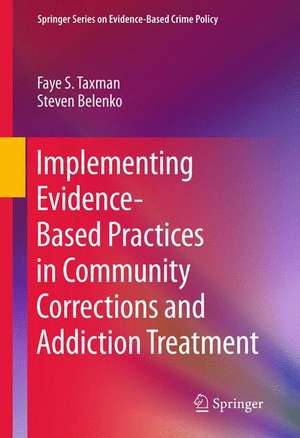Implementing Evidence-Based Practices in Community Corrections and Addiction Treatment: Springer Series on Evidence-Based Crime Policy
Autor Faye S. Taxman, Steven Belenkoen Limba Engleză Hardback – 19 noi 2011
Featuring the first model of implementation strategies linking these fields, Implementing Evidence-Based Practices in Community Corrections and Addiction Treatment sets out criteria for identifying practices and programs as evidence. The book’s detailed blueprint is based on extensive research into organizational factors (e.g., management buy-in) and external forces (e.g., funding, resources) with the most impact on the adoption of evidence-based practices, and implementation issues ranging from skill building to quality control. With this knowledge, organizations can set realistic, attainable goals and achieve treatment outcomes that reflect the evidence base.
Included in the coverage:
- Determining evidence for “what works.”
- Organization change and technology transfer: theory and literature review.
- The current state of addiction treatment and community corrections.
- Unique challenges of evidence-based addiction treatment under community supervision.
- Assessing suitability of evidence-based practice in real-world settings.
- A conceptual model for implementing evidence-based treatment in community corrections.
Implementing Evidence-Based Practices in Community Corrections and Addiction Treatment is a breakthrough volume for graduate- and postgraduate-level researchers incriminology, as well as policymakers and public health researchers.
| Toate formatele și edițiile | Preț | Express |
|---|---|---|
| Paperback (1) | 723.05 lei 6-8 săpt. | |
| Springer – 11 dec 2012 | 723.05 lei 6-8 săpt. | |
| Hardback (1) | 643.80 lei 6-8 săpt. | |
| Springer – 19 noi 2011 | 643.80 lei 6-8 săpt. |
Preț: 643.80 lei
Preț vechi: 757.41 lei
-15% Nou
Puncte Express: 966
Preț estimativ în valută:
123.29€ • 125.81$ • 103.73£
123.29€ • 125.81$ • 103.73£
Carte tipărită la comandă
Livrare economică 25 februarie-11 martie
Preluare comenzi: 021 569.72.76
Specificații
ISBN-13: 9781461404118
ISBN-10: 1461404118
Pagini: 300
Ilustrații: XIV, 318 p. 28 illus.
Dimensiuni: 155 x 235 x 25 mm
Greutate: 0.64 kg
Ediția:2012
Editura: Springer
Colecția Springer
Seria Springer Series on Evidence-Based Crime Policy
Locul publicării:New York, NY, United States
ISBN-10: 1461404118
Pagini: 300
Ilustrații: XIV, 318 p. 28 illus.
Dimensiuni: 155 x 235 x 25 mm
Greutate: 0.64 kg
Ediția:2012
Editura: Springer
Colecția Springer
Seria Springer Series on Evidence-Based Crime Policy
Locul publicării:New York, NY, United States
Public țintă
Professional/practitionerCuprins
Introduction.- Theories of Organizational Change Approaches.- Determining the Evidence Base for Addiction Treatment Programs.- Technology Transfer Process and Models.- Current State of the Corrections Field.- Current State of the Addiction Treatment Field.- The Nuances of the Correctional and Addiction Treatment Environments.- Substance Abuse Agencies.- A Conceptual Model of Technology Transfer of Evidence-Based treatment to Community Corrections.- Supporting the Model.- The Challenges of Intervention Fidelity.- Expanding the Concept for Evidence-Based Practice.- Adapting to the Environment.- Conclusion and Recommended Next Steps.
Recenzii
"This book could not be more timely. Community-based sanctions are attracting widespread attention, and many hope they will reduce recidivism and costs. But that won't happen unless we pay attention to implementation, the black box that Taxman and Belenko have unpacked in this outstanding book. Changing practice is more than just changing policies. Real change requires engaging community correctional agencies and their partners in the implementation process. This book provides new insights and a comprehensive framework for delivering programs that work and are sustainable. Any agency involved in implementing rehabilitation programs will be well advised to read this book closely. I highly recommend it."
Joan Petersilia
Adelbert H. Sweet Professor of Law
and Co-Director, Stanford Criminal Justice Center
Stanford Law School
Joan Petersilia
Adelbert H. Sweet Professor of Law
and Co-Director, Stanford Criminal Justice Center
Stanford Law School
Textul de pe ultima copertă
Community corrections programs can be effective for advancing public safety and improving public health among drug-involved offenders, provided that research-based programs and practices are used. Since evidence-based practice is gaining recognition as a success factor in both community corrections and substance abuse treatment systems, a merger of the two seems logical and desirable. The creation of a seamless system of care is needed to address all desired outcomes. But integrating evidence-based addiction treatment and community corrections is no small feat—costs, personnel decisions, identification of effective and appropriate interventions and practices, interorganizational processes, and common goals and mission are critical considerations to advance implementation
Featuring the first model of implementation strategies linking these fields, Implementing Evidence-Based Practices in Community Corrections and Addiction Treatment sets out criteria for identifying evidence-based practices and programs and proposes new strategies to advance the uptake of these practices in real world settings. The book’s detailed blueprint is based on extensive theory and research into organizational factors (e.g., management buy-in, staff development, intervention features) and external forces (e.g., funding, resources, stakeholder commitment) with the most impact on the adoption and sustainability of evidence-based practices. Implementation issues range from skill building to quality control. With this knowledge, organizations can set realistic, attainable goals and achieve safety and treatment outcomes that reflect the evidence base. The goal is to provide evidence-based implementation frameworks and strategies to ensure that findings from research studies can be replicated in real world operational agencies.
Included in the coverage:
Implementing Evidence-Based Practices in Community Corrections and Addiction Treatment is a breakthrough volume for graduate- and postgraduate-level researchers in public health and criminology, as well as policymakers, program managers, and researchers.
Featuring the first model of implementation strategies linking these fields, Implementing Evidence-Based Practices in Community Corrections and Addiction Treatment sets out criteria for identifying evidence-based practices and programs and proposes new strategies to advance the uptake of these practices in real world settings. The book’s detailed blueprint is based on extensive theory and research into organizational factors (e.g., management buy-in, staff development, intervention features) and external forces (e.g., funding, resources, stakeholder commitment) with the most impact on the adoption and sustainability of evidence-based practices. Implementation issues range from skill building to quality control. With this knowledge, organizations can set realistic, attainable goals and achieve safety and treatment outcomes that reflect the evidence base. The goal is to provide evidence-based implementation frameworks and strategies to ensure that findings from research studies can be replicated in real world operational agencies.
Included in the coverage:
- Determining evidence for “what works” and the issues surroundingtransportability.
- Organization change and technology transfer: theory and literature review.
- The current state of addiction treatment and community corrections.
- Unique challenges of evidence-based addiction treatment in community supervision settings.
- Assessing suitability of evidence-based practice in real-world settings.
- Two conceptual models: one to assess the transportability of evidence into operational settings and one to implement evidence-based treatment in community corrections.
Implementing Evidence-Based Practices in Community Corrections and Addiction Treatment is a breakthrough volume for graduate- and postgraduate-level researchers in public health and criminology, as well as policymakers, program managers, and researchers.
Caracteristici
Addresses evidence-based correctional practice, evidence-based treatment in correctional settings and the organizational change-component Covers the timely and important issue of implementation science Provides practical advice for furthering addiction treatment Includes supplementary material: sn.pub/extras

















